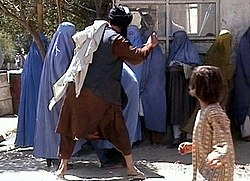Islamic Emirate of Afghanistan (1996–2001)
The Islamic Emirate of Afghanistan (Pashto: د افغانستان اسلامي امارت, Da Afġānistān Islāmī Amārāt) is an Islamic state governed by the Taliban that is the de facto current government of Afghanistan since 2021, and has also ruled the country from 1996 to 2001.
Islamic Emirate of Afghanistan د افغانستان اسلامي امارت Da Afġānistān Islāmī Amārāt | |||||||||
|---|---|---|---|---|---|---|---|---|---|
| 1996–2001 | |||||||||
| Motto: | |||||||||
| Anthem: | |||||||||
 | |||||||||
| Status | Partially recognized state (1996–2001) Insurgency (2001–2021) Unrecognized state (2021–present) | ||||||||
| Capital and largest city | Kabul | ||||||||
| Official languages |
| ||||||||
| Religion | Sunni Islam | ||||||||
| Demonym(s) | Afghan | ||||||||
| Government | Unitary Islamic theocracy administered by shura councils[1] | ||||||||
| Amir al-Mu'minin (Commander of the Faithful) | |||||||||
• 1996–2001 (became defacto government after 2021) | Mohammed Omar | ||||||||
• 2016–present | Hibatullah Akhundzada | ||||||||
| Vice Emir | |||||||||
• 2021–present | Abdul Ghani Baradar | ||||||||
| Prime Minister | |||||||||
• 1996–2001 | Mohammad Rabbani | ||||||||
• 2001 | Abdul Kabir (acting) | ||||||||
| Legislature | none | ||||||||
| History | |||||||||
• Mohammad Omar proclaimed Commander of the Faithful | 3 April 1996 | ||||||||
• | 27 September 1996[2] | ||||||||
• Name changed to "Emirate" | 29 October 1997 | ||||||||
| 7 October 2001 | |||||||||
| 13 November 2001 | |||||||||
| 17 December 2001 | |||||||||
| 15 August 2021 | |||||||||
| Area | |||||||||
| 2000 | 587,578 km2 (226,865 sq mi) | ||||||||
| Population | |||||||||
• 2001 | 26,813,057 | ||||||||
• 2021 | 39,905,102 | ||||||||
| Currency | Afghani | ||||||||
| Calling code | +93 | ||||||||
| ISO 3166 code | AF | ||||||||
| |||||||||
Between 1996 and 2001, it controlled approximately 90% of the country as an insurgency, whereas remaining regions in the northeast were held by the Northern Alliance, which maintained broad international recognition as a continuation of the Islamic State of Afghanistan. After the September 11 attacks and subsequent declaration of a "War on Terrorism" by the United States, international opposition to the regime drastically increased, with diplomatic recognition from the United Arab Emirates and Pakistan being rescinded.
The Islamic Emirate was overthrown by the Northern Alliance on 17 December 2001, which had been bolstered by the ISAF coalition established after a U.S.-led invasion of the country two months prior. The Taliban has continued to refer to itself as the Islamic Emirate of Afghanistan in official communications from 2001 until 2021.
During the 2021 Taliban offensive, the Islamic Emirate regained effective control of the governance of Afghanistan following the Fall of Kabul on 15 August 2021.
Islamic Emirate Of Afghanistan (1996–2001) Media
A member of the Taliban's religious police beating a woman in Kabul on 26 August 2001. The footage was filmed by RAWA.
Afghanistan opium poppy cultivation, 1994–2016 (hectares). Before the US invasion of Afghanistan in 2001, opium production was almost entirely eradicated (99%) by the Taliban.
Related pages
References
- ↑ Gunaratna, Rohan; Woodall, Douglas (2015). Afghanistan After the Western Drawdown. p. 117.
- ↑ Marcin, Gary (1998). "The Taliban". King's College. Retrieved 26 September 2011.



